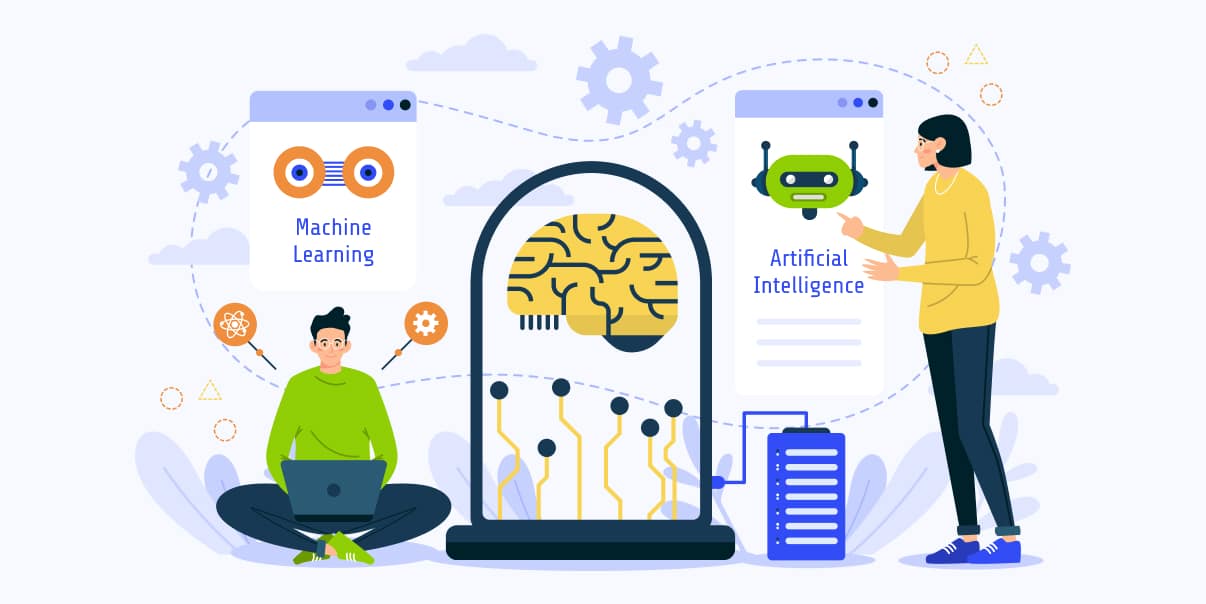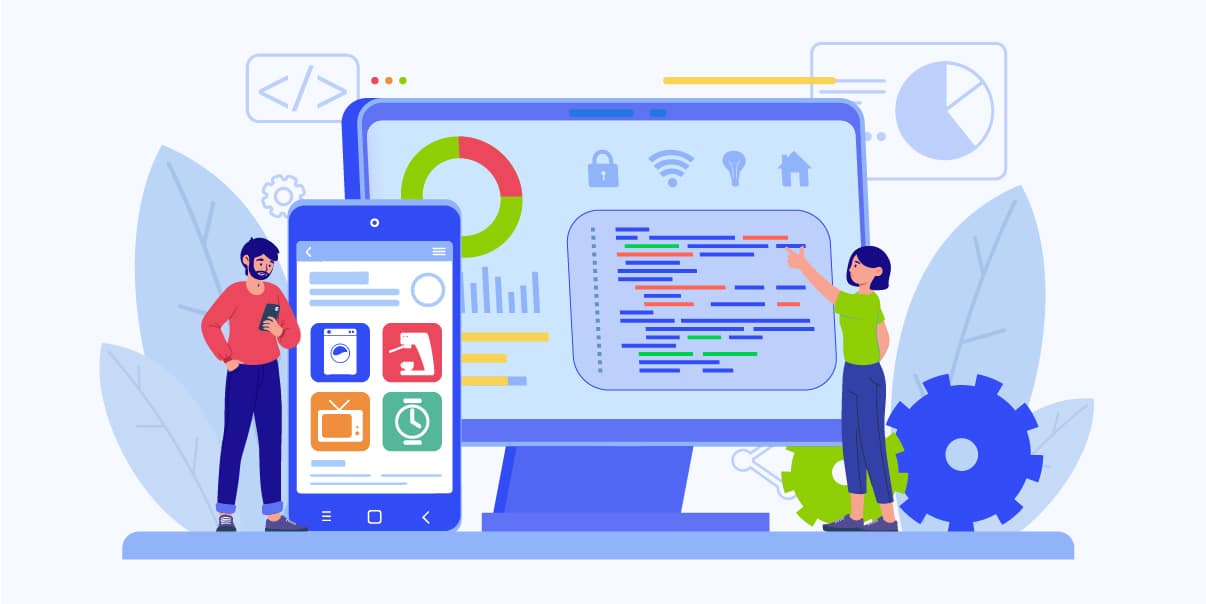Machine Learning in Mobile App Development: What You Need to Know

Have you ever wondered how technology can give your app a competitive edge?
Machine learning (ML) equips developers with powerful tools to create more responsive and robust applications. In this blog post, we’ll explore the use of machine learning in mobile app development and its advantages. We’ll also touch on factors to consider before integrating ML into your projects.
Keep reading to learn how to maximize the potential of machine learning for your mobile app development!
What Is Machine Learning?
Machine learning is the process of teaching computers to make decisions on their own. This technology provides the computer with large amounts of data and allows it to discover patterns independently. The more data the computer is fed, the better it can learn and make decisions.
Machine learning is a powerful form of AI that allows computers to make decisions without being programmed. It uses algorithms to explore large amounts of data and make predictions. You can use machine learning in different apps, such as the following:
- Image recognition
- Natural language processing
- Financial forecasting
- Autonomous driving
Why Is Machine Learning Important for Mobile Apps?
Have you ever wondered why more apps on your phone seem to be getting more intelligent? That is because they are using something called machine learning.
Machine learning is an essential tool in developing mobile applications. It allows apps to provide more personalized experiences and better performance for users. Moreover, it teaches computers to think like humans by using data to solve problems and make predictions. With machine learning, mobile apps can predict user behaviors and suggest new features based on user data.
Here are some of the ways machine learning can impact mobile applications:
Boosts User Engagement
Machine learning makes apps more interesting for people who use them. It looks at user data to determine what the user wants and needs. Machine learning can also help developers know when users have trouble using an app. This way, they can improve the app for everyone.
With machine learning, developers can also identify which features users like best. They can understand how users engage with their app so they can make better experiences for each user. When an app is more personalized and exciting, people use it more often. As a result, the app becomes more popular and gets downloaded more times.
Determines App User’s Behavior
Machine learning allows users to automate processes and make smarter decisions. It can also detect user behavior using data collected from user interactions. It reveals insights into how they use the application. You can use this information to do the following:
- Improve user experience
- Enhance marketing strategies
- Optimize product features
- Increasing engagement and retention
Filters Spam
Mobile app developers rely on machine learning algorithms to protect users from malicious spam. These algorithms recognize the features of a potential spam message, such as:
- Sender’s reputation
- Content of the message
- Grammar
- Spelling
The algorithm identifies a possible match and filters out messages before reaching a user’s inbox. This process allows for fewer false positives, which makes for a safer mobile experience.
Improves Online Security
Machine learning is revolutionizing online security for mobile apps in many ways. By using predictive algorithms, mobile apps can detect patterns that show suspicious behavior. Moreover, machine learning identifies potential vulnerabilities in mobile apps. It also alerts developers when there is malicious code. Thanks to this, consumers can have peace of mind knowing that their data is secure, even when using a mobile app.
Originates Predictive Analysis
Mobile apps that use machine learning can predict what users need. They do this by looking at data from past events. This way, the app can change its interface based on how users interact with it.
App developers can create tailored experiences based on users’ past behaviors and preferences by combining machine learning with predictive analysis. That said, machine learning assists mobile app developers in creating engaging user experiences. Also, ML algorithms are constantly learning and adjusting their predictions to provide better experiences for users.
What Are the Different Types of Machine Learning Algorithms?
Machine learning algorithms help us create robust models to process data and make predictions. Let’s take a closer look at the different algorithms used today.
Supervised Learning (SL)
Supervised learning is the most popular machine learning algorithm. It uses labeled data sets to predict outcomes and make decisions accurately. The machine is taught by an expert, or “supervisor,” who provides feedback on its accuracy. Examples of supervised learning algorithms include decision tree, linear regression, and logistic regression.
In SL, we supply the machine with two types of data: the input and the output. The input is the information we want to use for something useful, like predicting who will win a game or what movie someone might like, while the output results from this prediction.
The SL algorithm takes these two pieces of data and examines many examples to learn how they are related. In this case, the algorithm can look at all the movies people have watched before and predict which one they will watch next.
Unsupervised Learning (UL)
Unsupervised learning helps computers learn without explicit instructions or labels. It works by having the computer analyze data and discover patterns and connections between different pieces of information.
With UL, computers can discover things about the data that humans may not have noticed. Suppose you show a computer image of cats and dogs. In that case, it can identify that cats and dogs are two distinct types of animals without anyone ever telling it so.
Reinforcement Learning (RL)
Reinforcement learning is artificial intelligence that helps machines learn through trial and error. It provides rewards when the machine performs certain activities correctly and punishments when it doesn’t. This way, the machine can learn how to do tasks better over time. It is like having an invisible teacher who rewards good behavior and punishes bad behavior. Also, RL provides an efficient tool for developing autonomous decision-making systems.
How Machine Learning Can Be Helpful for Mobile App Development Services [Infographics]
Machine learning can help mobile app developers succeed. It provides insight into how users interact with their apps so they can make informed decisions.
Below are some ways machine learning can be helpful for mobile app development:
![How Machine Learning Can Be Helpful for Mobile App Development Services [Infographics] by BIT Studios](https://www.bitstudios.com/wp-content/uploads/2023/06/Machine-Learning-in-Mobile-App-Development.jpeg)
Advanced Search
Advanced search has become an essential element of mobile app development. It allows developers to sift through large volumes of data quickly. With advanced search options, users can customize searches to find what they are looking for fast. Moreover, it reduces the time spent navigating through many results.
This tool brings sophisticated functionality, including predictive searching and quick filtering capabilities. Developers can create more user-friendly experiences with advanced search.
Personalization
Personalization allows companies to meet customer needs. Businesses can create a more pleasant experience for their target audience by personalizing apps with user data. In turn, it increases engagement and loyalty.
Also, personalization improves the overall user experience. It eliminates friction points, optimizes content, and offers a tailored approach to each user. This aspect of ML makes it easier for users to find what they are searching for. It also reduces frustration with features that are irrelevant to them. Hence, personalization helps developers create a compelling product that builds long-lasting customer relationships.
Enhanced Security Level
Mobile application security is a top priority for many developers. ML algorithms ensure mobile apps can protect user data and fend off malicious threats. With machine learning, developers can detect patterns of potential fraud or malware more effectively. This way, they can secure the app against cyberattacks, preventing hackers from accessing sensitive information stored in the app.
More Relevant Ads
Ads are an essential source of revenue for many mobile applications. Machine learning helps developers target users with more relevant ads, increasing the chance of conversions. With machine learning algorithms, developers can learn customer behavior and interests to tailor their ad campaigns better.
For example, machine learning can detect customer browsing history patterns to create accurate and targeted ads. This technique increases the likelihood of users clicking on the ad and taking action. As a result, machine learning helps developers maximize their return on advertisement investments (ROI).
Predicting User Behavior
User behavior prediction is essential for creating better user experiences. It helps developers identify users’ preferred features and how they interact with their apps.
Machine learning can analyze user data and figure out patterns that reveal insights into user behavior. This way, developers can anticipate what users might do next so they can tailor their experience better. Machine learning can help developers create more engaging apps with this data.
What Are the Top Machine Learning Mobile Application Examples?
Machine learning mobile applications are becoming an integral part of people’s lives. Below are some machine learning mobile applications examples:
Facebook is one of the leading mobile applications when it comes to machine learning. Its extensive use of AI allows it to create more personalized user experiences. For example, it can suggest friends you may know or show you relevant posts based on your interests. AI also helps recognize images, understand voice commands, and provide more accurate search results.
Also, Facebook employs natural language processing (NLP), image recognition, and data analysis algorithms. Additionally, its large user base allows companies to quickly test and deploy new ML models in real-world settings.
Snapchat
Snapchat’s facial recognition has leveraged deep learning algorithms that generate accurate results. It uses NLP to recognize text from images and videos. AI helps Snapchat suggest fun filters and lenses you can use with friends. You can ensure that only the people you want to see your messages will see them.
AI helps Snapchat keep your messages private and secure. As a result, it allows users to filter through the content easily. Thus, Snapchat’s ability to use machine learning to create a better user experience stands out among other mobile apps.
Spotify
Spotify is one of the leading mobile applications leveraging machine learning technology. It recommends music to its users based on their listening history and preferences. You can easily pause the music, skip ahead, or go back to a previous song.
All this is possible because machine learning makes the application more innovative and can learn from your tastes. Also, Spotify has powerful search algorithms that allow users to discover new music. Hence, it is a prime example of how machine learning can be integral to mobile apps as it provides.
eBay
eBay is a leading mobile application example of machine learning technology. It uses automation to analyze user data, helping you find the best deals and personalized recommendations. Its AI-driven Marketplace Insights helps buyers make more intelligent decisions around pricing strategy. With eBay, you can narrow your search using filters and even chat with a seller before making a purchase. Machine learning helps eBay better understand user needs and tailor its services to each user.
Also, eBay provides insights into trends like historical sales data and price ranges for similar listings. Machine learning allows you to expect a tailored online shopping experience with this app.
What Are the Challenges in Machine Learning and Their Solutions?
Machine learning is a powerful tool, but some challenges can arise. Here are some common difficulties encountered with machine learning and the possible solutions:
Data Augmentation
Data augmentation involves adding more data to existing machine learning datasets. This task can be challenging since machine learning algorithms need lots of data for accurate predictions and decisions. One way to overcome this difficulty is to use techniques like synthetic data generation, which adds artificial data to the dataset.
Also, you can use transfer learning to make the machine learning model more robust. This step allows developers to train an existing ML model on a new dataset.
Data Addition Imitation
Data addition imitation presents a challenge when machine learning algorithms need to learn from large datasets. It takes time and resources to collect and label data, making it difficult to add more data.
One way to overcome this difficulty is by using semi-supervised learning. This technique uses a small dataset with labeled information and unlabeled data. The machine learning algorithm can learn from the labeled data and make predictions on the unlabeled data.
In addition, you can use reinforcement learning to teach a machine based on feedback. This technique uses rewards or punishments to train models in real-world environments. As such, it is an effective ML technique for mobile app development.
Hard Sample Mining
Hard sample mining occurs when machine learning algorithms can’t accurately predict a particular data set’s output. It’s usually because the machine doesn’t have enough information to learn from or has not been appropriately trained. You can use active and deep reinforcement learning techniques to overcome this challenge.
Active learning helps machine learning algorithms find more information from unlabeled data. Then, machine learning models can learn from this new information and become more accurate with their predictions. On the other hand, deep reinforcement learning uses rewards and punishments to improve machine learning models’ performance.
Machine learning has made significant strides in mobile app development over the past few years. It helps developers create better user experiences and maximize ROI. With machine learning, mobile apps can become more intelligent and personalized. Despite the challenges, machine learning is a powerful tool for mobile app development services. It provides insight into how users interact with their apps and helps developers create even better user experiences in the future.
Conclusion
Machine learning can do amazing things in the mobile app industry. Still, you must be aware of its limitations. Since machine learning app development is constantly evolving, it’s helpful to keep up with the latest developments.
By understanding the fundamentals of machine learning and its application in mobile app development, developers can maximize the potential of their applications. And with the right team in your corner, machine learning can take your mobile application development to the next level.
Machine Learning in Mobile Application Development FAQs
What Is an ML Application?
Machine learning (ML) application is a computer algorithm that uses statistical analysis and mathematical modeling to process data. It allows computers to identify patterns, classify data, and make decisions. You can use ML in various fields, from healthcare to finance to autonomous vehicles. With the increasing volume of data generated by the Internet, ML has become an integral part of many businesses. Also, ML plays an essential role in apps like NLP, image recognition, and robotics.
What are Some Useful Tips for Developing Mobile Apps Using Machine Learning?
There are many factors to consider in machine learning application development. Here are several tips to get you started:
- Research machine learning development and identify which suits your mobile app best.
- Determine what data you need to develop your mobile app with machine learning.
- Start small by focusing on a single feature of your mobile app that you want to be powered by a machine learning algorithm.
- Test and analyze the performance of the model’s results after training it on collected data sets.
- Adjust your model’s performance and collect user feedback to improve it.
- Optimize and reduce the resources used to develop your app. And this will make it run faster and smoother and extend its battery life.
How Do Machine Learning Models Integrate With Android Apps?
Machine learning models can be integrated into an Android app in a few different ways. One way is to use machine learning libraries like TensorFlow, which allows you to define machine learning models and apply them directly on your Android device.
Another way is to use pre-trained machine learning models hosted on cloud services like Google Cloud Platform. It lets you store your machine learning models on the cloud and integrate them into your Android app with minimal effort.
Finally, machine learning models can be implemented using machine learning as a service (MLaaS). It allows organizations to outsource machine learning tasks, such as data collection and model training, to third-party providers. This way, machine learning models can be integrated into an Android app quickly and easily.
We’re BIT Studios!
At BIT Studios we specialize in designing, building, shipping, and scaling beautiful, usable products with blazing-fast efficiency



